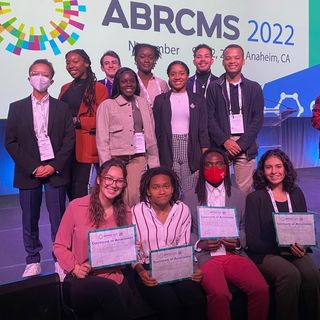Applications OPEN TILL April 22
About MARC@TU
In 2020, Temple University was awarded its second T34 MARC award T34GM136494 under the guidance of Dr. Rodrigo Andrade (of blessed memory), Dr. Spiridoula Matsika, and Dr. Grace Ma. Given the acronym MARC 2.0, this current grant seeks to build on the very successful MARC 1.0 led by Dr. Jacqueline Tanaka.
All trainees are required to pursue their research training full time as specified by the sponsoring institution in accordance with its own policies. Trainees are typically provided full-time support for TWO/THREE years of undergraduate studies. Use of training grant support in undergraduate research training is strongly encouraged to allow for the participation in research, training, mentoring, professional development, and cohort-building activities that will prepare the trainees to successfully transition into a biomedical, research-focused higher degree program
Program Goal
The goal of the Maximizing Access to Research Careers (MARC) program is to develop a diverse pool of undergraduates who complete their baccalaureate degree, and transition into and complete biomedical, research-focused higher degree programs (e.g., Ph.D. or M.D./Ph.D.).
Program Objective
The Overarching Objective of the Maximizing Access to Research Careers program is to develop a diverse pool of undergraduates who complete their baccalaureate degree and transition into and complete biomedical, research-focused higher degree programs (e.g., Ph.D. or M.D./Ph.D.).
The long-term goal is to develop a diverse pool of well-trained biomedical scientists, who have the following technical, operational, and professional skills:
- A broad understanding across biomedical disciplines and the skills to independently acquire the knowledge needed to advance their chosen fields;
- Expertise in a biomedical scientific discipline and the skills to think critically and independently, and to identify important biomedical research questions and approaches that push forward the boundaries of their areas of study;
- A strong foundation in scientific reasoning, rigorous research design, experimental methods, quantitative and computational approaches, and data analysis and interpretation;
- The skills to conduct research in the safest manner possible, and a commitment to approaching and conducting biomedical research responsibly, ethically, and with integrity;
- Experience initiating, conducting, interpreting, and presenting rigorous and reproducible biomedical research with increasing self-direction;
- The ability to work effectively in teams with colleagues from a variety of cultural and scientific backgrounds, and to promote inclusive and supportive scientific research environments;
- The skills to teach and communicate scientific research methodologies and findings to a wide variety of audiences (e.g., discipline-specific, across disciplines, and the public); and
- The knowledge, professional skills and experiences required to identify and transition into careers in the biomedical research workforce (i.e., the breadth of careers that sustain biomedical research in areas that are relevant to the NIH mission).
Diversity at all levels—from the kinds of science to the regions in which it is conducted to the backgrounds of the people conducting it— contributes to excellence in research training environments and strengthens the research enterprise. As part of a larger initiative to enhance diversity, the MARC program will support trainees who are earning a baccalaureate degree at research-intensive institutions and who intend to complete a biomedical research higher degree program (e.g., Ph.D., or M.D./Ph.D.).


